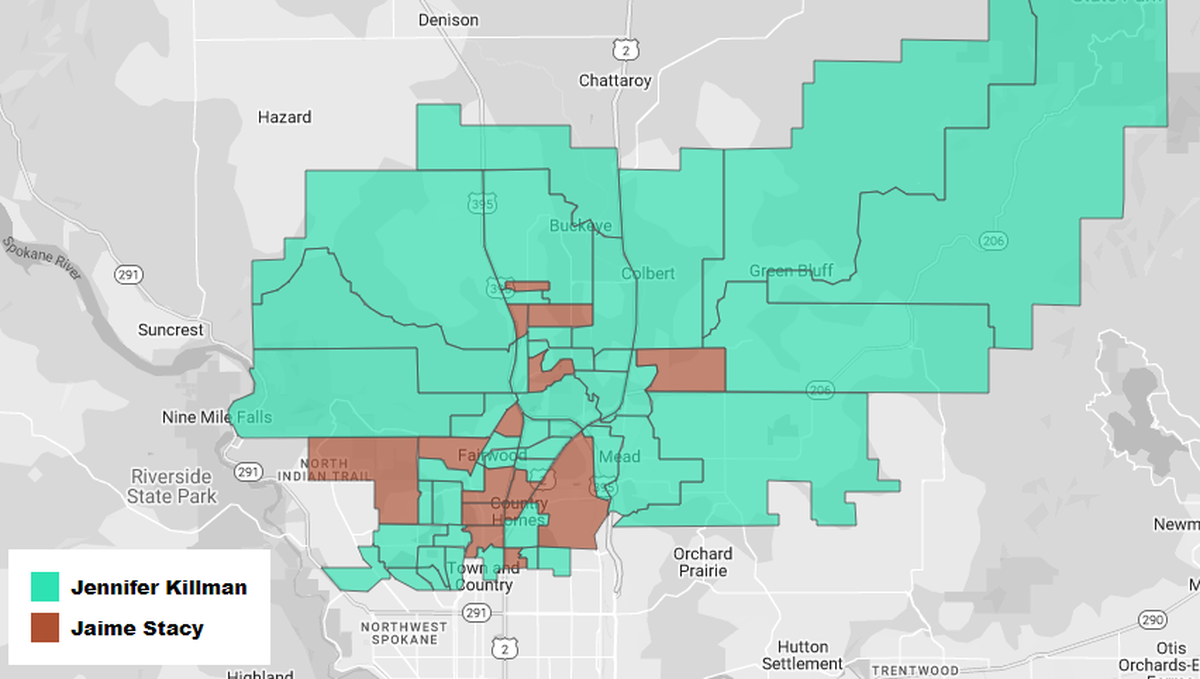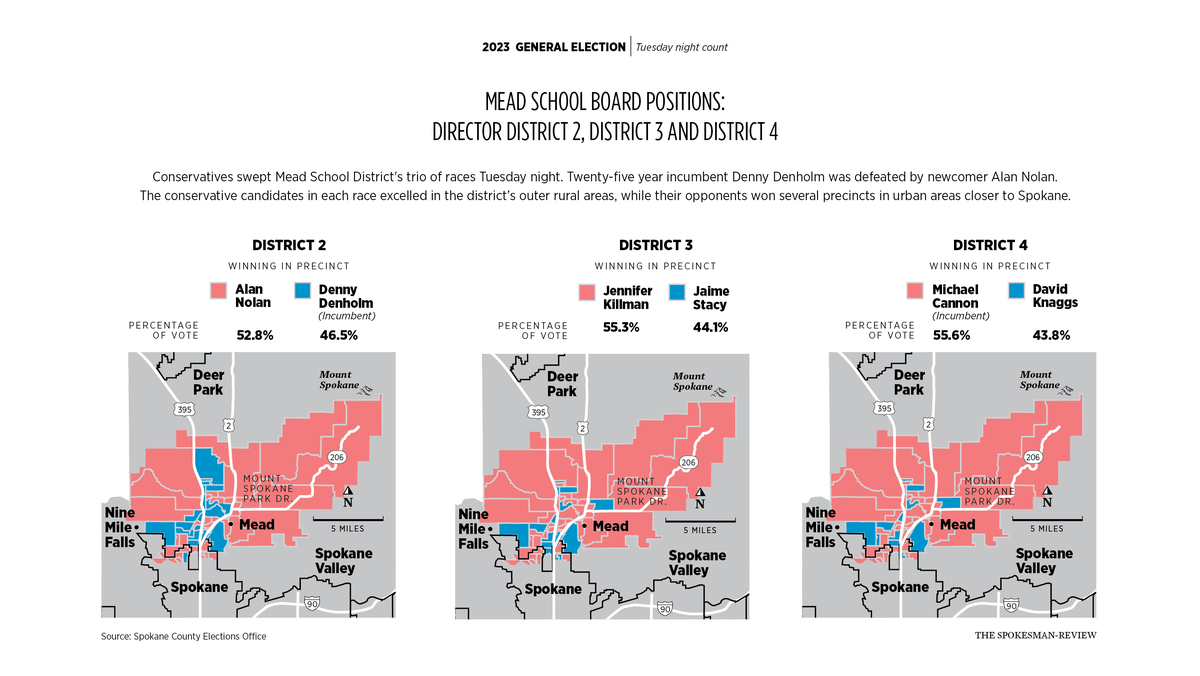New conservative majority on Mead School Board says they’ll represent parents. Some teachers worry that may come at the expense of students
Conservative Jennifer Killman defeated progressive candidate Jaime Stacey in a race for the Mead School Board in Tuesday's election.
Touting their focus on parental rights, Tuesday’s election has ushered in a new era for the Mead School Board with fresh faces and a renewed conservative vision.
In each of the three Mead races, the self-described conservative candidate won over their moderate or liberal rivals. Adding a self-styled conservative elected in 2021, the bloc now has a four-person majority on the five-person board.
In the wake of their victories, the winning candidates said their success owed not to their conservative credentials but their laser focus on parents of the district who they say have been overlooked by decades-long incumbents.
“We were attacked as bringing partisanship into the race, but really it’s the opposite,” said winner Alan Nolan, who defeated 25-year incumbent Denny Denholm. “Our goal is to bring the focus back strictly to education … and rebuild trust with the community.”
Re-elected incumbent Michael Cannon said the electorate should not expect a “dramatic shift” in policy but a renewed focus on parents.
“I think the voters made it clear tonight that they want a strong school board that represents parents in the community,” Cannon said.
Mead parent Sydney Charlton said she did not have trust in the previous board and before the election she had been considering home-schooling her two children.
“I was over the moon when they won. I literally teared up. I almost cried,” she said of the three winners. “It was that big of a relief to know that we finally have a majority of the board that is going to listen to parents, is going to be in the schools and interested in what’s actually going on,” she said.
Others expressed worries the new majority would overvalue the voice of parents to the detriment of teachers and students.
“None of them talked in their campaigns about how they would support the school district, it was only how they would support parents. And I feel like teachers are a pretty important part of the school district,” said Brentwood Elementary School teacher Suzy Pratt.
Mt. Spokane High School sophomore Ellie Henshaw said she fears the new board will “not care about student voice, teacher empowerment or inclusivity.”
“Personally the extremity and the suggestion of inclusion not being a priority amongst winning candidates worried me,” Henshaw said.
Charlton said it was opponents who brought politics into the race.
“They get labeled as extremist. We aren’t far-right extremists. We are just parents who do not want inappropriate literature in the library accessible to our kids.
“We don’t want things being taught that are harmful like CRT,” she said.
Will Mead’s new board bring back a CRT ban?
Cannon introduced a policy last year banning “critical race theory” from Mead schools.
In recent years, critical race theory has become associated nationally with parental concerns over the way the history of racism is taught in public K-12 schools. Rather than a framework used at these levels, critical race theory is a mode of legal analysis used in collegiate and post-graduate studies positing race as a socially constructed means to exploit people of color.
Bringing a great deal of attention to the district, the policy failed in a 3-2 vote at the time. Cannon and BrieAnne Gray supported it, while now-exiting members Bob Olson and Denny Denholm opposed it. With the makeup of the new board, the possibility remains another policy addressing “critical race theory” could be introduced and passed.
Speaking Tuesday night, the victorious conservatives said a specific critical race theory-ban is not on the immediate horizon but they remain committed to removing cultural issues from the classroom where they occur.
“I don’t know,” Cannon said when asked if he would reintroduce the proposal. “We’ll have to see how that goes or what the need is if it was something that the community wanted us to do.”
Nolan said a critical race theory resolution was “not a priority.”
Whether or not there is an explicit race theory policy, the new and returning board members said the electorate sent them a clear message.
The Mead community wants schools “free from political influence,” Cannon said.
Gray promised the board would “get politics out of the classroom.”
Nolan said “cultural issues” have “become a distraction” in schools even if their presence is not “overwhelming” in Mead compared to other districts.
“I don’t want divisive issues like that in the classroom,” Nolan said of critical race theory.
“Where there are people who are bringing in the premises of critical race theory, recognize no one is going to teach that as a curriculum item. Those premises – we try to take those and remove those so that they are not creating a distraction,” he said.
Asked what he considers critical race theory in a previous interview, Nolan pointed to the idea that America is inherently racist.
“Attacking America as being an inherently racist place … is not consistent with teaching morality and patriotism,” he said at the time.
Speaking Tuesday, Nolan said many teachers in the district also oppose critical race theory and “want to be able to teach their kids and see them excel.”
Losing candidate Jaime Stacy said she believes Cannon’s critical race theory policy or one similar to it will be reintroduced and passed.
“Parents need to be aware they will do this. My hope is parents are now aware and students are aware and they will get mobilized against it,” Stacy said.
If passed, Stacy believes there will be an exodus of teachers from the district who will refuse to follow such a policy.
That sentiment was echoed by one Mead School District teacher speaking a day after the election.
“If they mandate to teach things outside state requirements, they will not comply,” Pratt, who has taught in the district for decades.
In 2021 the state adopted new standards on “cultural competency, diversity, equity, and inclusion” that teachers are required to follow.
According to the Washington State Professional Educator Standards Board website, each teacher is required “center diversity, equity, and inclusion in the ways they support their students.”
If any policy or directive from the new school board violates this directive, teachers like her will continue to “teach what they are supposed to teach,” according to state standards.
Pratt emphasized diversity, equity, and inclusion standards do not constitute critical race theory but many believe they do.
“We don’t teach CRT. They ran campaigns on culture wars and things that are not happening in the classroom. But they’ve convinced parents that it is happening. And I’m really worried what might happen for teachers like me,” she said.
Pratt said she is prepared to leave the district after 25 years, should she be forced.
“If the school board starts telling me that I shouldn’t be teaching the curriculum that the state has told me that I need to, then I will leave,” she said.
This perception of the new board members is widespread among teachers, she added.
“It’s been a really sad day in our building. The teachers are very, very sad and depressed,” she said of the election.
Luke Blue contributed to this report.

